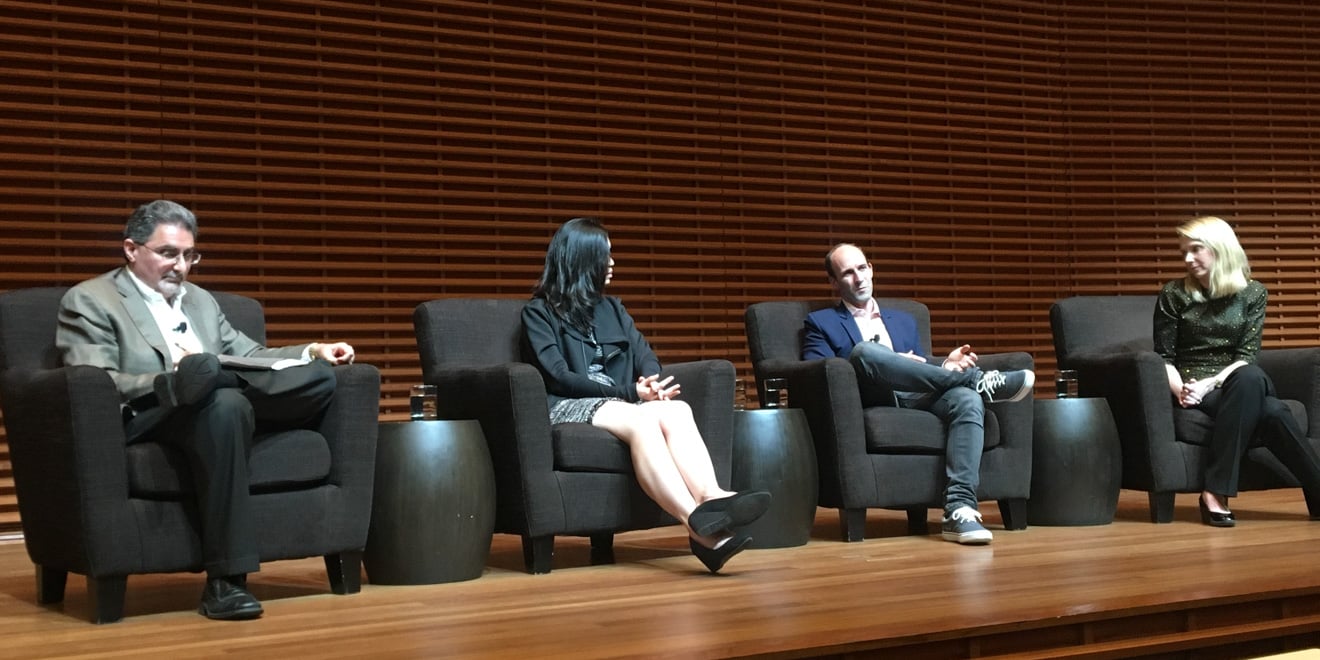On Monday night, entrepreneur Tracy Chou ’09 M.S. ’09, venture capitalist Scott Hartley ’05 and former Yahoo president Marissa Mayer ’97 M.S. ’99 discussed the divide between so-called “fuzzies” and “techies,” and how this divide plays out in hiring, salaries and work culture.
Professor and Associate Chair for Education in the Computer Science department Mehran Sahami ’92 M.S. ’93 Ph.D. ’99 moderated the conversation.
Sponsored by both the School of Engineering and the School of Humanities and Sciences, as well as Undergraduate Advising and Research, BEAM and Stanford Alumni Association, the talk drew many technical students who were curious to hear how the panelists approached the visible divide on campus.
“Apple always talks about standing at the intersection of humanities and tech, and … I’m not really sure what that means,” symbolic systems student and event attendee Kadar Qian ’20 said.
In a follow-up statement to The Daily, Qian clarified that as a Symbolic Systems major, he continues to seek definitional clarity on this crucial intersection.
“CS, while a powerful tool, only solves a sliver of the problems facing…industries,” he wrote. “It takes the marriage of these two fields to create a harmonious and elegant solution.”
“Really, I think for me this notion is a false duality,” began Hartley, author of “The Fuzzy and the Techie: Why the Liberal Arts Will Rule the Digital World.”
Hartley explained that launching engineering products involves “fuzzy” aspects such as anthropological research, while work in fields such as political science can involve statistical software and other “harder” skills.
“It’s really not one versus the other, but how we bring these two things together,” Hartley said.
Overall, the panel expressed optimism about bridging the divide between “techies” and “fuzzies,” but some felt that the panel itself was emblematic of how humanities are treated at Stanford.
After the lecture, computer science students Diego Hernandez ’17 M.S. ’18 and Amy Liu ’18 M.S. ’18 said they were surprised that no humanities-focused individuals were present on the panel. According to Liu, the humanities receive second-rate treatment and are only used as a supplement to help STEM fields.
“It’s clear that he was talking to a particular group of people in there,” Hernandez said.
Chou, who studied electrical engineering, said that she regrets the condescending attitude she held toward the humanities while she was at Stanford. She explained that while working at Quora, a questions-and-answers site, she and her team had to think about philosophical questions about human nature and community design.
“Realizing how much we as engineers who write code were imposing our view of the world on our product and our users made me realize how little I was equipped to do that well,” Chou said.
Both Mayer and Hartley were optimistic about humanities students’ capacity for success in the tech industry. Hartley gave the example of Flickr and Slack founder Stewart Butterfield, who earned two philosophy degrees. According to Mayer, some of her most effective employees work at the intersection between the two worlds.
However, Chou was more skeptical.
“I do think it is undeniable that there is a huge gap in compensation,” Chou said. “If you study computer science or some technical field, it’s a lot easier to get a job because there is a straight line between the degree and the end roles that need to be filled.”
Chou was also more hesitant when it came to ethics. The panelists discussed the recent Cambridge Analytica scandal and its implications for the future of the industry.
“I think it’s very hard to expect that in a world that is so capitalistic, that companies will necessarily just move in the most ethical directions,” Chou added.
Mayer disagreed with Chou and Hartley, arguing that the scandal did not signify an ethical lapse, but rather showed an example of people being less versed in the complex systems which involved personal data. She said she believes that companies will improve with more experience.
Contact Anat Peled at anatpel ‘at’ stanford.edu.
